三年级上册短语复习题
三年级上学期组词、词语、短语等归类复习

三年级语文上册组词复习组词。
耍( ) 杂( ) 推( ) 究( ) 要( ) 朵( ) 准( ) 穷( ) 峰( ) 郊( ) 诚( ) 纪( ) 蜂( ) 郊( ) 城( ) 记( ) 杨( ) 邮( ) 精( ) 佳( ) 扬( ) 油( ) 情( ) 挂( ) 披( ) 料( ) 视( ) 线( ) 破( ) 科( ) 现( ) 钱( ) 陶( ) 朴( ) 管( ) 抢( ) 淘( ) 扑( ) 馆( ) 枪( ) 猜( ) 盼( ) 险( ) 通( ) 请( ) 粉( ) 验( ) 痛( ) 情( ) 扮( ) 剑( ) 桶( ) 坪( ) 戴( ) 蝴( ) 粗( ) 评( ) 带( ) 湖( ) 祖( ) 钓( ) 察( ) 辫( ) 仰( ) 钩( ) 查( ) 瓣( ) 迎( ) 勇( ) 洞( ) 脯( ) 惜( ) 痛( ) 铜( ) 捕( ) 借( ) 备( ) 堆( ) 坑( ) 社( ) 奋( ) 推( ) 抗( ) 肚( ) 准( ) 峰( ) 测( ) 秦( ) 谁( ) 锋( ) 侧( ) 春( ) 促( ) 忆( ) 异( ) 遥( ) 捉( ) 亿( ) 导( ) 摇( ) 精( ) 村( ) 抖( ) 坊( ) 睛( ) 材( ) 蚪( ) 房( ) 萝( ) 粮( ) 湿( ) 娇( ) 锣( ) 浪( ) 温( ) 桥( ) 播( ) 修( ) 论( ) 验( ) 插( ) 休( ) 轮( ) 捡( ) 超( ) 坚( ) 镜( ) 待( ) 招( ) 竖( ) 境( ) 诗( ) 访( ) 探( ) 摘( ) 飘( ) 坊( ) 深( ) 滴( ) 漂( ) 燥( ) 辨( ) 验( ) 常( ) 躁( ) 辩( ) 检( ) 堂( ) 澡( ) 辫( ) 险( ) 裳( )仆( ) 止( ) 肌( ) 肢( ) 扑( ) 此( ) 机( ) 枝( ) 丈( ) 血( ) 县( ) 设( ) 仗( ) 皿( ) 具( ) 没( ) 爪( ) 授( ) 朴( ) 寺( ) 瓜( ) 受( ) 仆( ) 等( ) 断( ) 妆( ) 孤( ) 帆( ) 段( ) 装( ) 狐( ) 凡( ) 蓝( ) 鱼( ) 武( ) 赏( ) 兰( ) 渔( ) 式( ) 堂( ) 映( ) 软( ) 捡( ) 线 ) 英( ) 欣( ) 拣( ) 浅( ) 刮( ) 断( ) 集( ) 持( ) 括( ) 继( ) 级( ) 诗( ) 架( ) 炮( ) 鞋( ) 锯( ) 驾( ) 泡( ) 挂( ) 据( ) 难( ) 陶( ) 虚( ) 受( ) 谁( ) 淘( ) 虑( ) 爱( ) 值( ) 姿( ) 投( ) 通( ) 植( ) 资( ) 没( ) 痛( ) 励( ) 绳( ) 险( ) 系( ) 厉( ) 蝇( ) 验( ) 索( ) 绪( ) 予( ) 担( ) 买( ) 堵 ( ) 矛( ) 但( ) 卖( ) 糖( ) 粉( ) 捧( ) 骆( ) 塘( ) 纷( ) 棒( ) 格( ) 槐( ) 苞( ) 缕( ) 炊( ) 愧( ) 包( ) 楼( ) 吹( ) 塞( ) 郊( ) 糖( ) 盼( ) 赛( ) 较( ) 唐( ) 纷( ) 即( ) 管( ) 阶( ) 免( ) 既( ) 官( ) 价( ) 兔( )三年级上学期词语、短语等归类复习题一、把下列词语补充完整。
三年级英语上册整册书短语句子默写表教师版(外研版三起)
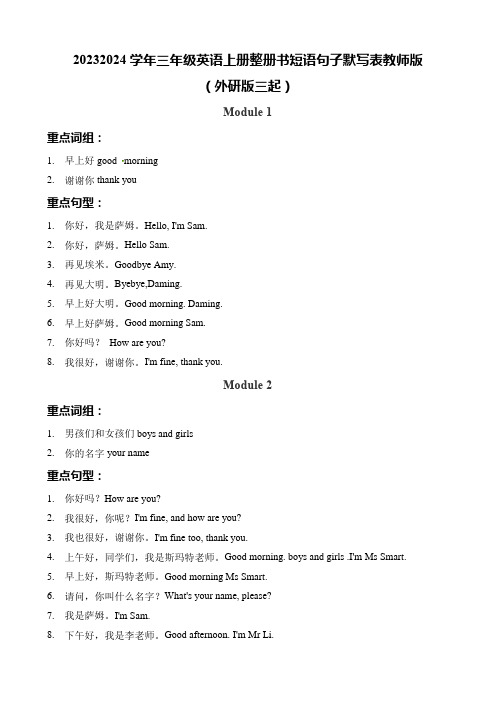
20232024学年三年级英语上册整册书短语句子默写表教师版(外研版三起)Module 1重点词组:1.早上好good morning2.谢谢你thank you重点句型:1.你好,我是萨姆。
Hello, I'm Sam.2.你好,萨姆。
Hello Sam.3.再见埃米。
Goodbye Amy.4.再见大明。
Byebye,Daming.5.早上好大明。
Good morning. Daming.6.早上好萨姆。
Good morning Sam.7.你好吗?How are you?8.我很好,谢谢你。
I'm fine, thank you.Module 2重点词组:1.男孩们和女孩们boys and girls2.你的名字your name重点句型:1.你好吗?How are you?2.我很好,你呢?I'm fine, and how are you?3.我也很好,谢谢你。
I'm fine too, thank you.4.上午好,同学们,我是斯玛特老师。
Good morning. boys and girls .I'm Ms Smart.5.早上好,斯玛特老师。
Good morning Ms Smart.6.请问,你叫什么名字?What's your name, please?7.我是萨姆。
I'm Sam.8.下午好,我是李老师。
Good afternoon. I'm Mr Li.9.下午好,李老师。
Good afternoon, Mr Li.Module 3重点词组:1.指向......point to...2.起立stand up3.坐下sit down重点句型:1.请起立,玲玲。
Please stand up, Lingling.2.请坐下。
Sit down, Please.3.指向门Point to the door. 。
4.指向窗户。
三年级语文上册短语复习
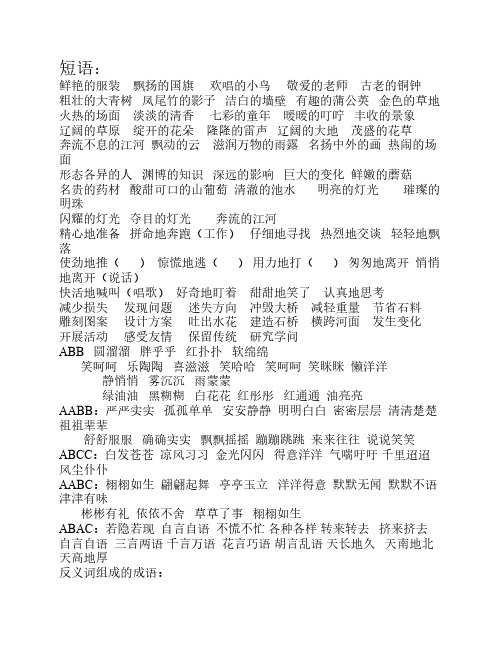
短语:鲜艳的服装飘扬的国旗欢唱的小鸟敬爱的老师古老的铜钟粗壮的大青树凤尾竹的影子洁白的墙壁有趣的蒲公英金色的草地火热的场面淡淡的清香七彩的童年暖暖的叮咛丰收的景象辽阔的草原绽开的花朵隆隆的雷声辽阔的大地茂盛的花草奔流不息的江河飘动的云滋润万物的雨露名扬中外的画热闹的场面形态各异的人渊博的知识深远的影响巨大的变化鲜嫩的蘑菇名贵的药材酸甜可口的山葡萄清澈的池水明亮的灯光璀璨的明珠闪耀的灯光夺目的灯光奔流的江河精心地准备拼命地奔跑(工作)仔细地寻找热烈地交谈轻轻地飘落使劲地推()惊慌地逃()用力地打()匆匆地离开悄悄地离开(说话)快活地喊叫(唱歌)好奇地盯着甜甜地笑了认真地思考减少损失发现问题迷失方向冲毁大桥减轻重量节省石料雕刻图案设计方案吐出水花建造石桥横跨河面发生变化开展活动感受友情保留传统研究学问ABB 圆溜溜胖乎乎红扑扑软绵绵笑呵呵乐陶陶喜滋滋笑哈哈笑呵呵笑眯眯懒洋洋静悄悄雾沉沉雨蒙蒙绿油油黑糊糊白花花红彤彤红通通油亮亮AABB:严严实实孤孤单单安安静静明明白白密密层层清清楚楚祖祖辈辈舒舒服服确确实实飘飘摇摇蹦蹦跳跳来来往往说说笑笑ABCC:白发苍苍凉风习习金光闪闪得意洋洋气喘吁吁千里迢迢风尘仆仆AABC:栩栩如生翩翩起舞亭亭玉立洋洋得意默默无闻默默不语津津有味彬彬有礼依依不舍草草了事栩栩如生ABAC:若隐若现自言自语不慌不忙各种各样转来转去挤来挤去自言自语三言两语千言万语花言巧语胡言乱语天长地久天南地北天高地厚反义词组成的成语:远近闻名黑白相间轻重倒置高低不平左右为难左抵右挡左顾右盼南腔北调东游西荡异口同声左邻右舍里应外合深入浅出出生入死头重脚轻舍近求远口是心非声东击西眼高手低转危为安数量词:一把钥匙一盒颜料一把扇子一枚邮票一首歌曲一排大雁一阵叮咛一片丰收一滴汗水一颗谷粒一团漆黑一把斧头一条马路一座酒楼一乘轿子一家店铺一个场面一头毛驴一场秋雨描写心情的词语:笑逐颜开心花怒放兴高采烈眉开眼笑恼羞成怒怒发冲冠火冒三丈暴跳如雷垂头丧气大惊失色提心吊胆谈虎色变惊弓之鸟。
新版三年级英语上册单词句子短语期末总复习

2013年新版三年级英语上册单词句子短语期末总复习一、单词归类复习具(钢笔) pencil (铅笔) pencil-box ( 铅笔盒) ruler(尺子)aser(橡皮) crayon (蜡笔) book (书) bag (书包)2.颜色red (红色的) yellow (黄色的) green (绿色的) blue (蓝色的)white (白色的) black (黑色的) orange (橙色的) brown (棕色的)3.身体部位head (头) face( 脸) nose (鼻子) mouth (嘴) eye (眼睛) leg (腿)ear (耳朵) arm (胳膊) foot (脚) body (身体) 4.动物cat (猫) dog (狗) monkey (猴子) panda (熊猫) duck (鸭子) g (猪) bird (鸟) bear (熊) elephant (大象) tiger(老虎)5.食物cake (蛋糕) bread (面包) juice (果汁) milk (牛奶) water (水)egg(蛋) fish(鱼) rice(米饭)6.数字(一) two (二) three (三) four (四) five(五)six( 六) seven (七) eight (八) nine( 九)ten( 十)二、勾出不同类的单词1.A. pen B. bd D. era2.A. bird B. cat C. dog DA. one B. waDA. red B. gllow DA. white B. faD. bodA. crayon B. ruler C. elephant D. eraA. bread B. mouth C. water D. milA. seven B. two C. six D. fivA. headB. faceC. blackD. a0.A. blue B. yellow C. red D三、勾出拼写正确的单词1.A. enp B2.A. pencil B. cillA. erlur B. rulerC. ruerl4.A. eraser B. serare C. aA. yoncra B. craaA. koob B. bbA. gab B. agb C. bag8.A. red B. der C. rdA. llowye B. yellow C. owll0.A. neerg B. ggA. lueb B . blue C. uelb12.A. white B. tewhi C. wA. ckbla B. black C. bcklaA. angeor B. orgean C. orangA. brown B. wnbbwA. deah B. head C. adA. cefa B. feca C/ faA. seno BA. thmou B. mouu20.A. yee B21.A. leg B. gle C. gel22.A. rea B. ear C. a23.A. arm B. mra C. rma 24.A. toof B25.A. bdoy B. yobd C. body26.A. tac B. cat C. atc27.A. gdo B. odg C. dog28.AB29.A. panda B. dapan C. aandp30.A. ckdu B. ucdk C. duA. gpi B. pig C. g2.A. bird B. irdb C. bdA. brea B. reab C. bitdA. phanteleB. elephantC. antelA. tierg B. tiggA. keac B. eackC. caA. readb B. dreab C. breadA. juice B. ceijuuA. ilmk B. mllk40.A. waert B. water C. wertaA. gge B. egg C. ege 42.A. fish BA. ceri BA. one BA. otw B. two C. owABA. foru B. four C. ouA. five B. vvA. sxi B. xx 50.A. evens B. eevvA. theig B. gg2.A. nine BA. nte B四、对话复习1、A: Hello! (你好!)B: Hi / hello! (你好!)2、A:What’s your name?你叫什么名字?B:My name’/ I’我的名字是陈洁/ 我叫陈洁3、A: Bye.(再见)B: See you.(再见) / Goodbye.(再见)4、A: I have a ruleran eraser 我有一把尺子一块橡皮。
2020三年级英语上册单词句子短语期末总复习人教PEP
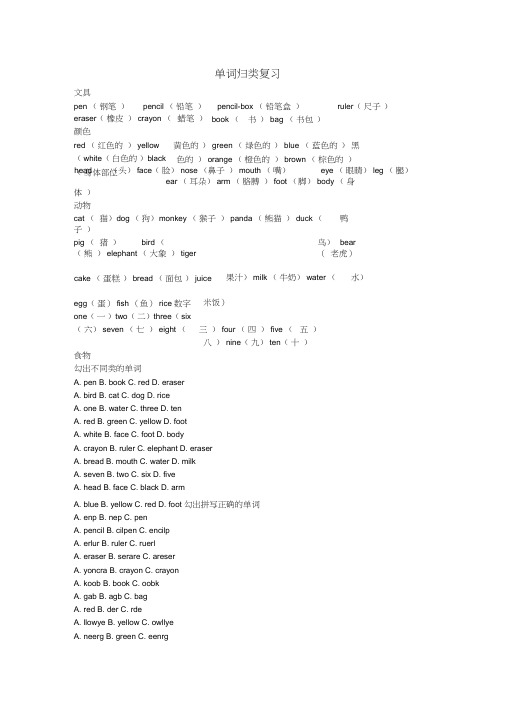
黄色的 ) green ( 绿色的 ) blue ( 蓝色的 ) 黑色的 ) orange ( 橙色的 ) brown ( 棕色的 )ear ( 耳朵) arm ( 胳膊 ) foot ( 脚) body ( 身体 )动物cat ( 猫) d og ( 狗) monkey ( 猴子 ) panda ( 熊猫 ) duck ( 鸭子 )pig ( 猪 ) bird (鸟) bear ( 熊 ) elephant ( 大象 ) tiger( 老虎) 食物勾出不同类的单词A. penB. bookC. redD. eraserA. birdB. catC. dogD. riceA. oneB. waterC. threeD. tenA. redB. greenC. yellowD. footA. whiteB. faceC. footD. bodyA. crayonB. rulerC. elephantD. eraserA. breadB. mouthC. waterD. milkA. sevenB. twoC. sixD. fiveA. headB. faceC. blackD. armA. blueB. yellowC. redD. foot 勾出拼写正确的单词A. enpB. nepC. penA. pencilB. cilpenC. encilpA. erlurB. rulerC. ruerlA. eraserB. serareC. areserA. yoncraB. crayonC. crayonA. koobB. bookC. oobkA. gabB. agbC. bagA. redB. derC. rdeA. llowyeB. yellowC. owllyeA. neergB. greenC. eenrg文具pen ( 钢笔 ) pencil ( 铅笔 ) eraser ( 橡皮 ) crayon ( 蜡笔 ) 颜色单词归类复习 pencil-box ( 铅笔盒 ) book ( 书 ) bag ( 书包 ) ruler ( 尺子 ) head (头) face ( 脸) nose (鼻子 ) mouth ( 嘴) eye ( 眼睛) leg ( 腿) red ( 红色的 ) yellow ( white ( 白色的 ) black ( 身体部位cake ( 蛋糕 ) bread ( 面包 ) juice(果汁) milk ( 牛奶) water ( 水) egg ( 蛋) fish (鱼) rice 数字one ( 一 ) two ( 二) three ( six( 六) seven ( 七 ) eight ( 米饭) 三 ) four ( 四 ) five ( 五 )八 ) nine ( 九) ten ( 十 )A. lueb B . blue C. uelbA. whiteB. tewhiC. wtehiA. ckblaB. blackC. bcklaA. angeorB. orgeanC. orange A. brown B. wnbor C. orbwn A. deah B. head C. adehA. cefaB. feca C/ faceA. senoB.oens C. noseA.thmouB. mouthC. mthou A. yee B. eey C. eye A. leg B. gle C. gel A. rea B. ear C. aer A. arm B. mra C. rma A. toof B. ootf C. footA. bdoyB.yobdC. bodyA. tacB. catC. atcA. gdoB. odgC. dogA. keymonB. monkeyC. meykon A. panda B. dapan C. aandpA. ckduB. ucdkC. duckA. gpiB. pigC. gipA. birdB. irdbC. bdirA. breaB. reabC. bitdA. phanteleB. elephantC. anteleph A. tierg B. tiger C. ertigA. keacB. eackC. cakeA. readbB. dreabC. breadA. juiceB.ceijuC. icejuA. ilmkB. mlkiC. milkA. waertB.waterC.wertaA. ggeB. eggC. ege A. fish B. shfi C. shif A. ceri B. cier C. rice A. one B. eno C. noe A. otw B. two C. owtA. threeB.treehC.retheA. foruB. fourC. ourf A. five B. vefi C. fvei A. sxi B. xsi C. six A. evens B. eevns C. seven A. theig B. geith C. eight A. nine B. nnie C. iennA. nteB. tenC. ent对话复习1、A: Hello!B: Hi / hello! (3、A: Bye.( 再见)B: See you.( 再见 ) / Goodbye.( 再见 ) 4、 A: I have a ruler\an eraser我有一把尺子 \ 一块橡皮。
三年级英语常见短语记忆单选题20题
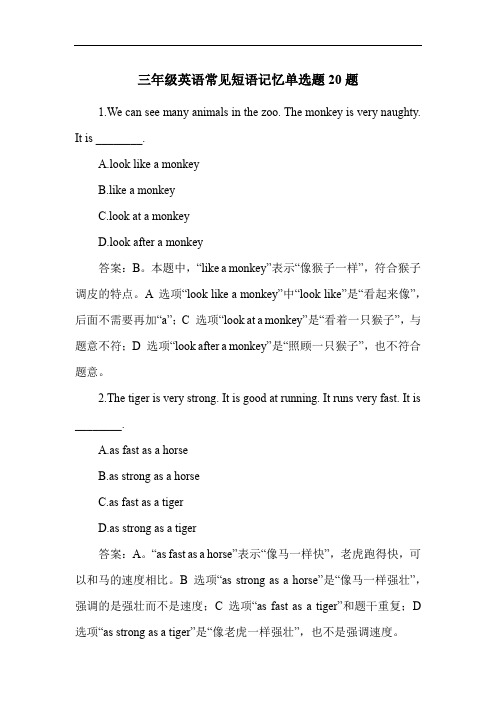
三年级英语常见短语记忆单选题20题1.We can see many animals in the zoo. The monkey is very naughty. It is ________.A.look like a monkeyB.like a monkeyC.look at a monkeyD.look after a monkey答案:B。
本题中,“like a monkey”表示“像猴子一样”,符合猴子调皮的特点。
A 选项“look like a monkey”中“look like”是“看起来像”,后面不需要再加“a”;C 选项“look at a monkey”是“看着一只猴子”,与题意不符;D 选项“look after a monkey”是“照顾一只猴子”,也不符合题意。
2.The tiger is very strong. It is good at running. It runs very fast. It is ________.A.as fast as a horseB.as strong as a horseC.as fast as a tigerD.as strong as a tiger答案:A。
“as fast as a horse”表示“像马一样快”,老虎跑得快,可以和马的速度相比。
B 选项“as strong as a horse”是“像马一样强壮”,强调的是强壮而不是速度;C 选项“as fast as a tiger”和题干重复;D 选项“as strong as a tiger”是“像老虎一样强壮”,也不是强调速度。
3.The panda is very cute. It likes eating bamboo. It is ________.A.look like a pandaB.like a pandaC.look at a pandaD.look after a panda答案:B。
三年级上册英语短语默写
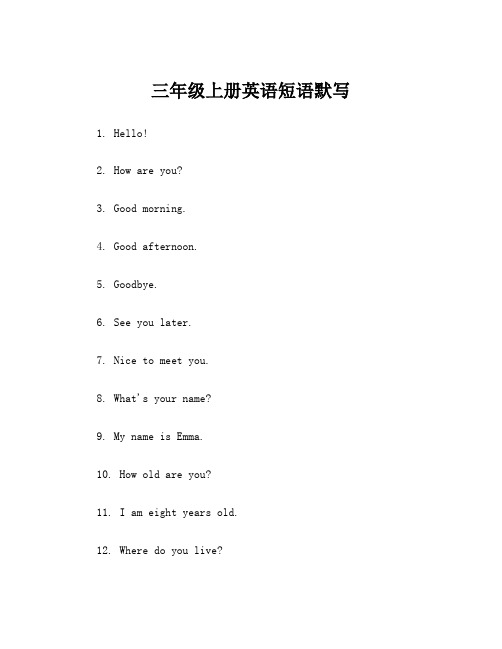
三年级上册英语短语默写1. Hello!2. How are you?3. Good morning.4. Good afternoon.5. Goodbye.6. See you later.7. Nice to meet you.8. What's your name?9. My name is Emma.10. How old are you?11. I am eight years old.12. Where do you live?13. I live in London.14. What's your favorite color?15. My favorite color is blue.16. What's your favorite food?17. My favorite food is pizza.18. Can I have a pencil, please?19. May I go to the bathroom?20. Excuse me, where is the library?21. How do you spell "cat"?22. What's this?23. It's a book.24. Where is the ball?25. The ball is under the table.26. Do you have any pets?27. Yes, I have a cat.28. What time is it?29. It's twelve o'clock.30. Can you play the piano?31. Yes, I can play the piano.32. Can I ride my bike?33. Yes, you can ride your bike.34. Let's play soccer.35. I like to draw pictures.36. Can you swim?37. No, I cannot swim.38. Can you read this book?39. Yes, I can read this book.40. What do you want to be when you grow up?41. I want to be a doctor.42. I like to play with my friends.43. I have a brother and a sister.44. Do you have any siblings?45. My teacher is nice.46. I like to eat ice cream.47. Can I have a glass of water?48. How many apples do you have?49. I have five apples.50. What is your favorite subject in school?51. My favorite subject is math.52. Can you help me with my homework?53. Thank you for your help.。
三年级英语常见短语记忆单选题20题
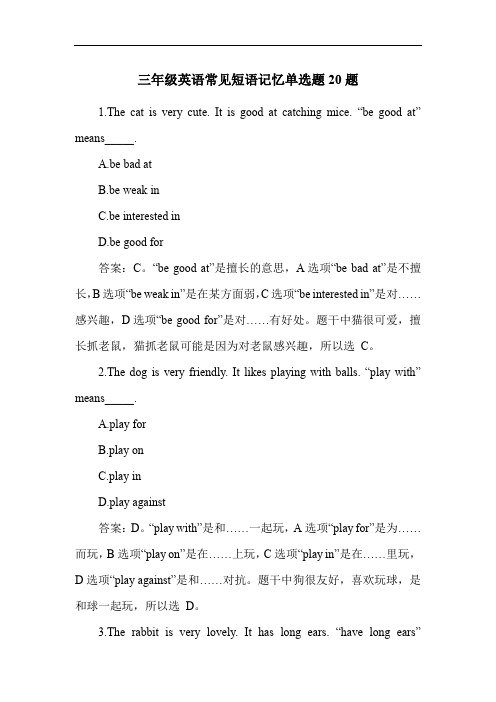
三年级英语常见短语记忆单选题20题1.The cat is very cute. It is good at catching mice. “be good at” means_____.A.be bad atB.be weak inC.be interested inD.be good for答案:C。
“be good at”是擅长的意思,A选项“be bad at”是不擅长,B选项“be weak in”是在某方面弱,C选项“be interested in”是对……感兴趣,D选项“be good for”是对……有好处。
题干中猫很可爱,擅长抓老鼠,猫抓老鼠可能是因为对老鼠感兴趣,所以选C。
2.The dog is very friendly. It likes playing with balls. “play with” means_____.A.play forB.play onC.play inD.play against答案:D。
“play with”是和……一起玩,A选项“play for”是为……而玩,B选项“play on”是在……上玩,C选项“play in”是在……里玩,D选项“play against”是和……对抗。
题干中狗很友好,喜欢玩球,是和球一起玩,所以选D。
3.The rabbit is very lovely. It has long ears. “have long ears”means_____.A.have short earsB.have big earsC.have small earsD.have no ears答案:B。
“have long ears”是有长耳朵,A选项“have short ears”是有短耳朵,B选项“have big ears”是有大耳朵,C选项“have small ears”是有小耳朵,D选项“have no ears”是没有耳朵。
小学语文三年级上册各类短语专项复习
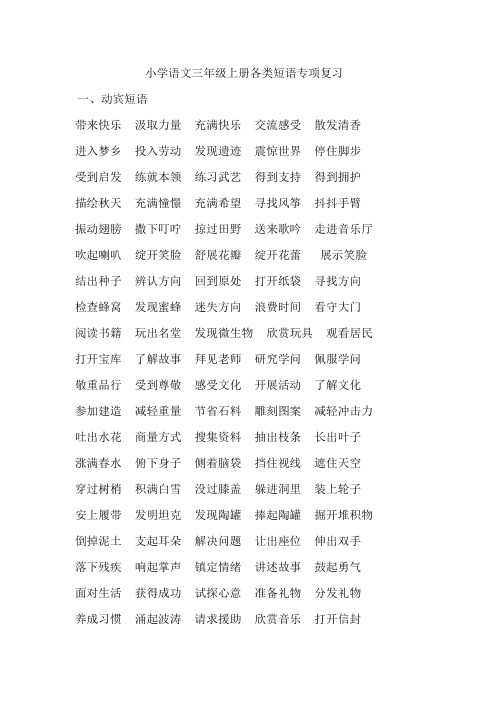
小学语文三年级上册各类短语专项复习一、动宾短语带来快乐汲取力量充满快乐交流感受散发清香进入梦乡投入劳动发现遗迹震惊世界停住脚步受到启发练就本领练习武艺得到支持得到拥护描绘秋天充满憧憬充满希望寻找风筝抖抖手臂振动翅膀撒下叮咛掠过田野送来歌吟走进音乐厅吹起喇叭绽开笑脸舒展花瓣绽开花蕾展示笑脸结出种子辨认方向回到原处打开纸袋寻找方向检查蜂窝发现蜜蜂迷失方向浪费时间看守大门阅读书籍玩出名堂发现微生物欣赏玩具观看居民打开宝库了解故事拜见老师研究学问佩服学问敬重品行受到尊敬感受文化开展活动了解文化参加建造减轻重量节省石料雕刻图案减轻冲击力吐出水花商量方式搜集资料抽出枝条长出叶子涨满春水俯下身子侧着脑袋挡住视线遮住天空穿过树梢积满白雪没过膝盖躲进洞里装上轮子安上履带发明坦克发现陶罐捧起陶罐掘开堆积物倒掉泥土支起耳朵解决问题让出座位伸出双手落下残疾响起掌声镇定情绪讲述故事鼓起勇气面对生活获得成功试探心意准备礼物分发礼物养成习惯涌起波涛请求援助欣赏音乐打开信封打招呼读课文做游戏看热闹打哈欠捉迷藏叠花篮守信用做试验做记号采花粉玩镜片找骆驼做买卖走江湖编故事二、补语热得吐出舌头热得耷拉着翅膀热得不知如何是好显得特别高兴打扮得绚丽多彩吓得又踢又跳累得倒了下去画得多么传神封得严严实实多得数不清长得葱葱茏茏吓得哇哇直叫看得出神显得更苍翠显得彬彬有礼变得鸦雀无声说得很好讲得很详细听得很认真羞得满脸通红三、偏正短语1、“的”字短语七彩的图画快乐的生活鲜艳的服装丰富多彩的生活飘扬的国旗好听的声音有趣的猴子有趣的蒲公英粗壮的枝干洁白的粉墙金色的草地白发苍苍的老爷爷可爱的草地古老的铜钟笔陡的石级觅食的小鸭子淡淡的清香勤劳的孩子绿色的草地粉红色的胸脯甜蜜的微笑火热的劳动快乐的歌声高大的白桦树欢快的灰雀诚实的男孩平整的土地深红色的胸脯突兀的石头遥远的秦岭亲爱的同志阳光明媚的早晨熟悉的人过硬的本领凛冽的寒冬著名的地质学家炎热的酷暑高强的武艺严明的纪律五彩缤纷的颜料缤纷的色彩美妙的声音心中的秋天油亮亮的衣裳巨大的木轮好闻的气味香香的梨辽阔的音乐厅甜甜的菠萝香甜的气味厚厚的衣裳超常的记忆力丰收的歌欢乐的歌丰富的色彩无法解释的本能道别的话音告别的歌韵暖暖的叮咛丰收的歌吟绽开的谷粒无穷的奥妙紫色的小喇叭艳丽的蔷薇娇嫩的花瓣强烈的阳光伟大的思想家干燥的空气淡雅的花蕾美丽的笑脸伟大的教育家密切的关系白色的记号遥远的家奔流不息的江河陌生的景物伟大的发现清闲的工作茂盛的花草树木全新的世界重要的成员丢失的骆驼滋润万物的雨露走失的骆驼巨大的宝库自豪的心情富饶的西沙群岛渊博的知识渊博的学问隆重的活动丰富多彩的文化精美的工艺古老的艺术独特的风俗风景优美的西沙群岛巨大的变化飘动的云隆隆的雷声特产丰富的西沙群岛辽阔的大地美丽的宇宙坚固的桥雄伟的赵州桥美观的桥精美的图案美丽的水花五光十色的海水宝贵的遗产热闹的场面紧急的时刻瑰丽无比的海水奔腾的江河澎湃的大海辽阔的草原各种各样的珊瑚茂密的森林宁静的山村繁华的都市圆溜溜的眼睛迷人的景色可爱的地方威武的龙虾拣不完的贝壳好看的鱼彩色的条纹美丽的贝壳颜色不一的贝壳有趣的海龟庞大的海龟厚厚的鸟粪千奇百怪的贝壳宝贵的肥料绿色的海洋嫩绿的叶子密密层层的枝叶美丽的花坛鲜嫩的蘑菇名贵的药材乳白色的浓雾厚厚的雪巨大的宝库美丽的风光酸甜可口的山葡萄璀璨的明珠著名的港口出色的表演又香又脆的榛子清澈的池水明亮的车灯闪光的长河又松又软的雪迷人的风景雄伟的三峡秀丽的山水又肥又厚的脚掌神奇的石窟富饶的物产紧张的关头五颜六色的焰火危急的关头好玩的东西懦弱的东西壮观的秦马兵俑轻蔑的神气荒凉的场地厚厚的尘土各种各样的问题光洁的陶罐朴素的陶罐美观的陶罐厚厚的堆积物漂亮的鹿匀称的身段精美的角聪明的头脑别致的角有力的长腿美丽的角滚滚的波涛难看的腿热烈的掌声持久的掌声优雅的音乐动听的声音极大的鼓励漂亮的礼物如愿以偿的笑脸重要的节日陌生的女孩调皮的孩子强烈的感情2、“地”字短语好奇地听着婉转地歌唱仔细地打量欢蹦乱跳地歌唱奇怪地问认真地挥舞勇敢地作战舒舒服服地睡大觉飞快地跑快活地喊拼命地奔跑不紧不慢地说不停地转匆匆地来匆匆地去准确无误地回家留心地观察陆续地开放悄悄地绽开懒洋洋地蠕动用心地观察认真地思考忿忿地说高兴地叫起来完整地保存淙淙地流着呼呼地刮过不假思索地说高兴地说傲慢地问谦虚地回答绝望地叫起来惊讶地说兴奋地说正确地对待如实地告诉默默地坐慢吞吞地站深深地鞠躬激动地抱起热烈地讨论诚挚的祝福羡慕地望着仔细地看着流利地背诵天真地说得意地转刻苦地钻研用心地学不住地吆喝小心地走着费劲地走四、数量词一棵树一条小路一间教室一只猴子一位老爷爷一种花一簇槐米一所学校一片草地一名少先队员一张相一只灰雀一个男孩一个早晨一架照相机一张纸一辆电车一个问题一根细苇一家杂志社一阵风一块巨石一把钥匙一盒颜料一位摄影师一件事一位朋友一把扇子一枚邮票一架显微镜一曲歌一排大雁一阵叮咛一片歌吟一片放大镜一首歌一片叶子一滴汗水一颗谷粒一位教育家一朵花一幅图画一个世界一座宝库一阵脚步声一扇门一个桥洞一乘轿子一簇红缨一块农田一座桥一片树木一层鸟粪一处景物一头耕牛一只鹿一串车灯一颗明珠一个池塘一匹快马一封信一面镜子一头狮子一条小溪一阵嘲笑一条狗一个瓶子一个铅锤一次实验一股寒流一口井一个商场一张卡片一张笑脸一个猎人一支笔一把长刀一袋麦子一架风车一个信箱一座山一滴眼泪一簇火苗一道金光一把小锁五、名句练习1、友谊的名句近朱者赤,近墨者黑。
三年级英语动词短语用法单选30题
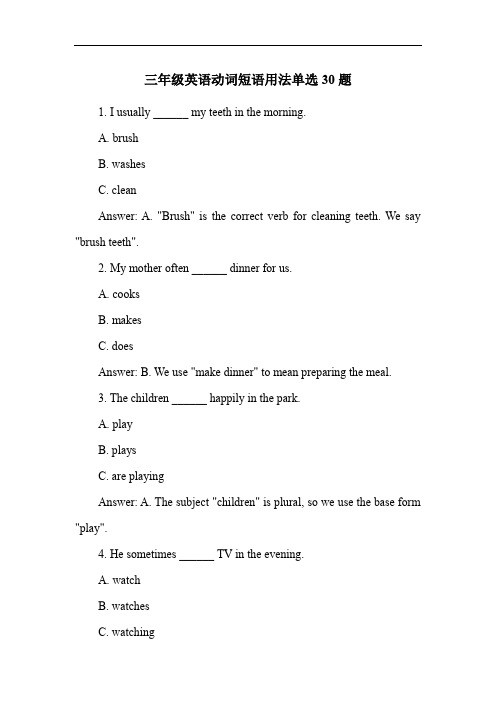
三年级英语动词短语用法单选30题1. I usually ______ my teeth in the morning.A. brushB. washesC. cleanAnswer: A. "Brush" is the correct verb for cleaning teeth. We say "brush teeth".2. My mother often ______ dinner for us.A. cooksB. makesC. doesAnswer: B. We use "make dinner" to mean preparing the meal.3. The children ______ happily in the park.A. playB. playsC. are playingAnswer: A. The subject "children" is plural, so we use the base form "play".4. He sometimes ______ TV in the evening.A. watchB. watchesC. watchingAnswer: B. "He" is singular, so we add -es to the verb and use "watches".5. They ______ football on the playground.A. playB. are playingC. playsAnswer: A. "They" is plural, and the sentence describes a usual activity, so we use "play".6. We often ______ in the playground at recess.A. play footballB. play the pianoC. read booksD. draw picturesAnswer: A. We play football in the playground.7. The students ______ their homework after school.A. doB. makeC. haveD. goAnswer: A. We say 'do homework' in English.8. They ______ a party in the classroom last week.A. haveB. hadC. hasD. havingAnswer: B. 'Last week' shows it's past tense, so we use 'had'.9. The teacher ______ a story to us every day.A. tellsB. tellC. tellingD. toldAnswer: A. The third person singular form of 'tell' is 'tells'.10. We ______ pictures in the art class.A. drawB. drawsC. drawingD. drewAnswer: A. 'We' is plural, so we use the base form 'draw'.11. We often ______ TV on weekends.A. watchB. watchesC. watchingD. to watchAnswer: A. “We” is a plural subject, and the base form of the verb isused after it. So, “watch” is the correct form.12. They like to ______ games in the park.A. playB. playsC. playingD. to playAnswer: A. “Like to do sth.” is the correct structure. So, “play” is the right choice.13. My sister enjoys ______ the piano.A. playB. playsC. playingD. to playAnswer: C. “Enjoy doing sth.” is the correct expression. So, “playing” is correct.14. He sometimes ______ football with his friends.A. playB. playsC. playingD. to playAnswer: B. “He” is a singular subject, and the verb needs to be in the third person singular form. So, “plays” is correct.15. We love ______ songs.A. singB. singsC. singingD. to singAnswer: C. “Love doing sth.” is the correct usage. So, “singing” is the answer.16. My mother is ___ dinner in the kitchen.A. cookingB. readingC. playingAnswer: A. "Cooking" means preparing food. My mother is preparing dinner, so the correct verb phrase is "cooking".17. My father ___ the newspaper in the living room.A. is watchingB. is readingC. is playingAnswer: B. "Reading" is the correct verb when it comes to looking at and understanding the words in a newspaper. So, the answer is "is reading".18. We ___ TV together every evening.A. watchB. readC. playAnswer: A. "Watch" is used when we look at something on a screen like TV. The correct verb phrase is "watch".19. My sister ___ her toys in her room.A. is playing withB. is cooking withC. is reading withAnswer: A. When we enjoy and use toys, we "play with" them. So,the answer is "is playing with".20. My brother ___ football in the park.A. is playingB. is readingC. is cookingAnswer: A. "Playing" is the right verb for doing sports like football. So, the answer is "is playing".21. In winter, we often ____ snowmen.A. makeB. makesC. makingD. to makeAnswer: A. In this sentence, “we” is a plural subject, and the base form of the verb “make” is used. So, the correct answer is A.22. It's sunny today. We can ____ outside.A. playB. playsC. playingD. to playAnswer: A. “We” is a plural subject, and the base form of the verb “play” is needed. Therefore, the answer is A.23. In autumn, the leaves ____ yellow.A. turnB. turnsC. turningD. to turnAnswer: A. “Leaves” is a plural noun, and the base form of the verb “turn” is used. So, A is the correct option.24. When it rains, we ____ an umbrella.A. useB. usesC. usingD. to useAnswer: A. “We” is the subject, and the base form “use” is needed. The answer is A.25. In summer, we like to ____ in the pool.A. swimB. swimsC. swimmingD. to swimAnswer: A. “We” require the base form of the verb, which is “swim”. So, the correct answer is A.26. We ______ a nice hotel when we were on vacation.A. stayed inB. stayed atC. lived inD. lived atAnswer: A. “Stay in” is used when referring to staying at a place for a short time, especially a hotel. “Stay at” is often used for a specific location that is not a hotel. “Live in” is for a more permanent residence. “Live at” is less common and not appropriate in this context.27. They ______ a lot of pictures during the trip.A. tookB. madeC. didD. hadAnswer: A. “Take pictures” is the common phrase for taking photographs. “Make” is not used in this way for pictures. “Did” and “had” don't fit the context of taking pictures.28. I ______ my bag on the train.A. forgotB. leftC. lostD. missedAnswer: B. “Left” is used when you leave something in a place by mistake. “Forgot” is more about not remembering. “Lost” means you no longer have it and don't know where it is. “Missed” has a different meaning and doesn't apply here.29. We ______ early to catch the train.A. got upB. stood upC. woke upD. came upAnswer: A. “Got up” means to rise from bed. “Stood up” is to stand from a sitting or lying position. “Woke up” is to stop sleeping but not necessarily get out of bed. “Came up” has a different meaning and is not suitable here.30. She ______ a postcard to her friend.A. sentB. gaveC. showedD. tookAnswer: A. “Sent” is the correct verb when you send something, like a postcard, to someone. “Gave” is more about handing something directly to someone. “Showed” is to display something. “Took” doesn't mean to send a postcard.。
三年级常见短语单选20题
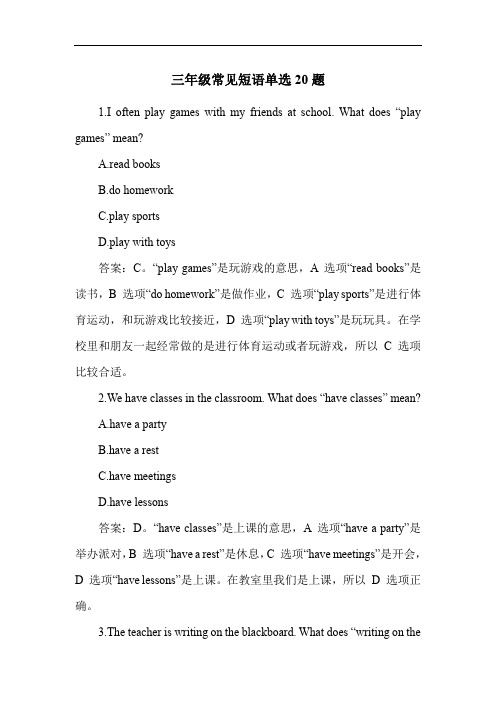
三年级常见短语单选20题1.I often play games with my friends at school. What does “play games” mean?A.read booksB.do homeworkC.play sportsD.play with toys答案:C。
“play games”是玩游戏的意思,A 选项“read books”是读书,B 选项“do homework”是做作业,C 选项“play sports”是进行体育运动,和玩游戏比较接近,D 选项“play with toys”是玩玩具。
在学校里和朋友一起经常做的是进行体育运动或者玩游戏,所以C 选项比较合适。
2.We have classes in the classroom. What does “have classes” mean?A.have a partyB.have a restC.have meetingsD.have lessons答案:D。
“have classes”是上课的意思,A 选项“have a party”是举办派对,B 选项“have a rest”是休息,C 选项“have meetings”是开会,D 选项“have lessons”是上课。
在教室里我们是上课,所以D 选项正确。
3.The teacher is writing on the blackboard. What does “writing on theblackboard” mean?A.drawing on the paperB.reading a bookC.cleaning the deskD.writing on the wall答案:A。
“writing on the blackboard”是在黑板上写字的意思,A 选项“drawing on the paper”是在纸上画画,和在黑板上写字都是用工具在平面上进行创作,有相似之处,B 选项“reading a book”是读书,C 选项“cleaning the desk”是清理课桌,D 选项“writing on the wall”是在墙上写字,通常不被允许。
三年级常见短语单选20题
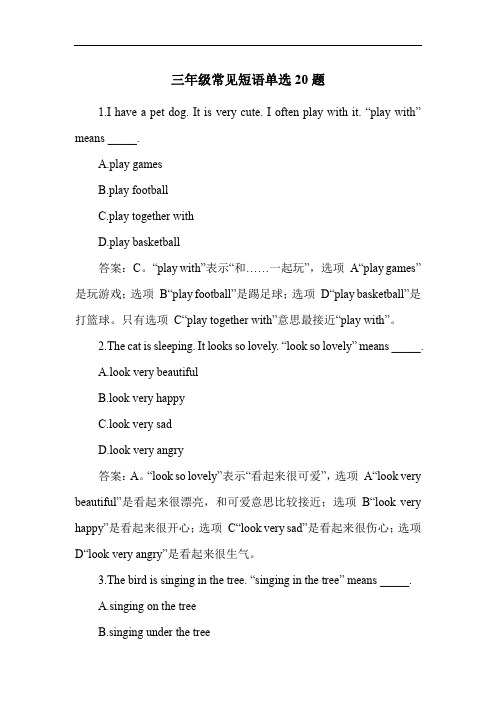
三年级常见短语单选20题1.I have a pet dog. It is very cute. I often play with it. “play with” means _____.A.play gamesB.play footballC.play together withD.play basketball答案:C。
“play with”表示“和……一起玩”,选项A“play games”是玩游戏;选项B“play football”是踢足球;选项D“play basketball”是打篮球。
只有选项C“play together with”意思最接近“play with”。
2.The cat is sleeping. It looks so lovely. “look so lovely” means _____.A.look very beautifulB.look very happyC.look very sadD.look very angry答案:A。
“look so lovely”表示“看起来很可爱”,选项A“look very beautiful”是看起来很漂亮,和可爱意思比较接近;选项B“look very happy”是看起来很开心;选项C“look very sad”是看起来很伤心;选项D“look very angry”是看起来很生气。
3.The bird is singing in the tree. “singing in the tree” means _____.A.singing on the treeB.singing under the treeC.singing above the treeD.singing inside the tree答案:A。
“singing in the tree”表示“在树上唱歌”,“in the tree”通常指外来的东西在树上,比如鸟。
三年级英语短语动词单选题40题
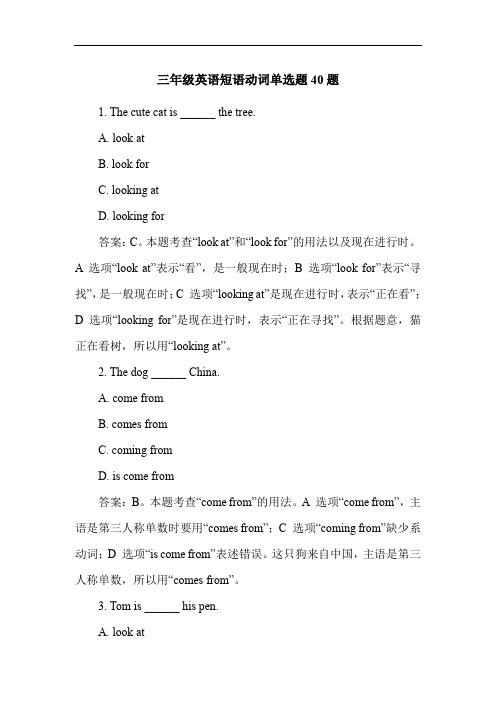
三年级英语短语动词单选题40题1. The cute cat is ______ the tree.A. look atB. look forC. looking atD. looking for答案:C。
本题考查“look at”和“look for”的用法以及现在进行时。
A 选项“look at”表示“看”,是一般现在时;B 选项“look for”表示“寻找”,是一般现在时;C 选项“looking at”是现在进行时,表示“正在看”;D 选项“looking for”是现在进行时,表示“正在寻找”。
根据题意,猫正在看树,所以用“looking at”。
2. The dog ______ China.A. come fromB. comes fromC. coming fromD. is come from答案:B。
本题考查“come from”的用法。
A 选项“come from”,主语是第三人称单数时要用“comes from”;C 选项“coming from”缺少系动词;D 选项“is come from”表述错误。
这只狗来自中国,主语是第三人称单数,所以用“comes from”。
3. Tom is ______ his pen.A. look atB. look forC. looking atD. looking for答案:D。
本题考查“look at”和“look for”的用法以及现在进行时。
A 选项“look at”表示“看”;B 选项“look for”表示“寻找”,是一般现在时;C 选项“looking at”表示“正在看”;D 选项“looking for”表示“正在寻找”。
根据题意,汤姆正在找他的笔,所以用“looking for”。
4. The bird ______ the sky.A. look atB. look forC. is looking atD. is looking for答案:C。
三年级英语短语动词单选题40题

三年级英语短语动词单选题40题1. I want to go ______ a picnic.A. forB. toC. inD. at答案:A。
本题考查短语“go for a picnic”( 去野餐)的用法。
选项B“to”通常表示“到……去”;选项C“in”用于表示在某个范围或空间内;选项D“at”用于表示在某个具体的地点或时间点。
“go for a picnic”是固定短语,所以选A。
2. Please come ______ my home.A. toB. atC. inD. on答案:A。
此题考查“come to”( 到……来)这个短语。
选项B“at”一般用于较小的地点;选项C“in”表示在……里面;选项D“on”表示在……上面。
“come to + 地点”表示到某个地方来,所以选A。
3. Let's go ______ the park.A. toB. inC. at答案:A。
本题考查“go to” 去……)的用法。
“go to + 地点”表示去某个地方,选项B“in”强调在……里面;选项C“at”用于小地点;选项D“for”表示目的或原因。
所以答案是A。
4. They come ______ school by bus.A. toB. atC. fromD. in答案:A。
“come to school”是“来学校”的常用表达。
选项B“at”不用于此;选项C“from”表示“从……”;选项D“in”不符合此语境。
因此选A。
5. I often go ______ with my friends.A. swimB. swimmingC. to swimD. swims答案:B。
“go swimming”是固定短语“去游泳”。
选项A 形式错误;选项C“to swim”一般不这样搭配;选项D“swims”是第三人称单数形式,主语是I 时不正确。
所以选B。
6. The boy is very happy. He gets a new toy. The meaning of "gets" here is _____.B. buysC. receivesD. finds答案:C。
三年级英语校园活动动词短语单选题30题
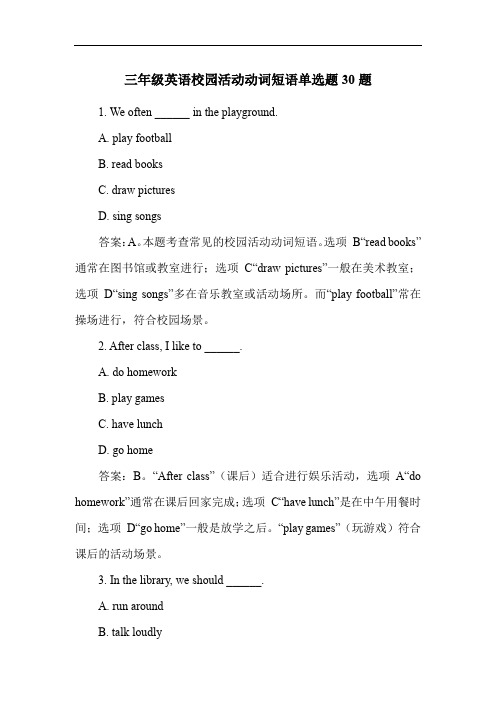
三年级英语校园活动动词短语单选题30题1. We often ______ in the playground.A. play footballB. read booksC. draw picturesD. sing songs答案:A。
本题考查常见的校园活动动词短语。
选项B“read books”通常在图书馆或教室进行;选项C“draw pictures”一般在美术教室;选项D“sing songs”多在音乐教室或活动场所。
而“play football”常在操场进行,符合校园场景。
2. After class, I like to ______.A. do homeworkB. play gamesC. have lunchD. go home答案:B。
“After class”(课后)适合进行娱乐活动,选项A“do homework”通常在课后回家完成;选项C“have lunch”是在中午用餐时间;选项D“go home”一般是放学之后。
“play games”((玩游戏)符合课后的活动场景。
3. In the library, we should ______.A. run aroundB. talk loudlyC. be quietD. play football答案:C。
在图书馆需要保持安静,选项A“run around”((到处跑)不合适;选项B“talk loudly”((大声说话)也不符合要求;选项D“play football”(踢足球)更不可能在图书馆进行。
“be quiet”(保持安静)是正确的。
4. We ______ in the classroom every morning.A. have classesB. sleepC. watch TVD. play basketball答案:A。
每天早上在教室是上课,选项B“sleep”((睡觉)通常在卧室;选项C“watch TV”((看电视)一般在家中客厅;选项D“play basketball”((打篮球)在操场。
三年级英语动词短语单选题30题

三年级英语动词短语单选题30题1.I often _____ my homework after school.A.doB.makeC.playD.watch答案:A。
“do one's homework”是固定短语,表示“做家庭作业”。
“make”通常表示“制作”;“play”一般和球类、乐器等搭配;“watch”通常表示“观看”。
2.My mother is cooking.She is _____ in the kitchen.A.reading booksB.watching TVC.cooking dinnerD.playing games答案:C。
妈妈在做饭,所以是“cooking dinner”( 做晚饭)。
“reading books”是读书;“watching TV”是看电视;“playing games”是玩游戏。
3.My father likes to _____ newspapers in the morning.A.lookB.seeC.readD.watch答案:C。
“read newspapers”是固定短语,表示“读报纸”。
“look”通常表示“看”,后面要跟介词at;“see”强调看到的结果;“watch”一般用于观看电视、比赛等。
4.I can _____ basketball very well.A.playB.doC.makeD.watch答案:A。
“play basketball”是固定短语,表示“打篮球”。
“do”通常表示“做”;“make”表示“制作”;“watch”表示“观看”。
5.The children are _____ in the park.A.reading booksB.singing songsC.playing gamesD.doing homework答案:C。
孩子们在公园里通常是“playing games” 玩游戏)。
三年级英语介词短语单选题30题
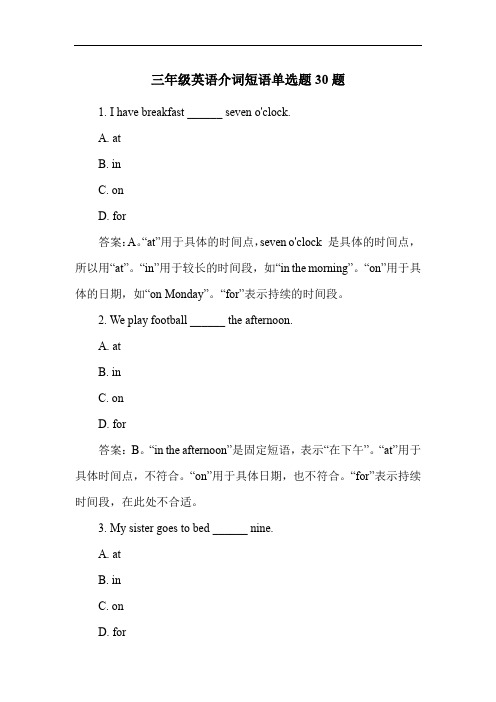
三年级英语介词短语单选题30题1. I have breakfast ______ seven o'clock.A. atB. inC. onD. for答案:A。
“at”用于具体的时间点,seven o'clock 是具体的时间点,所以用“at”。
“in”用于较长的时间段,如“in the morning”。
“on”用于具体的日期,如“on Monday”。
“for”表示持续的时间段。
2. We play football ______ the afternoon.A. atB. inC. onD. for答案:B。
“in the afternoon”是固定短语,表示“在下午”。
“at”用于具体时间点,不符合。
“on”用于具体日期,也不符合。
“for”表示持续时间段,在此处不合适。
3. My sister goes to bed ______ nine.A. atB. inC. onD. for答案:A。
“at”接具体的时间点,nine 是具体时间,所以用“at”。
“in”“on”“for”在这种语境下都不恰当。
4. They have a party ______ Sunday.A. atB. inC. onD. for答案:C。
“on”用于具体的日期,Sunday 是具体日期,所以用“on”。
“at”用于时间点。
“in”用于较长时间段。
“for”表示时间段。
5. I do my homework ______ the evening.A. atB. inC. onD. for答案:B。
“in the evening”是固定搭配,表示“在晚上”。
“at”接具体时间点。
“on”接具体日期。
“for”表示时间段,均不符合。
6. The cat is ______ the box.A. inB. onC. underD. behind答案:A。
本题考查地点介词的用法。
“in”表示在……里面,猫在盒子里面,符合语境。
三年级英语动词短语辨析单选题40题
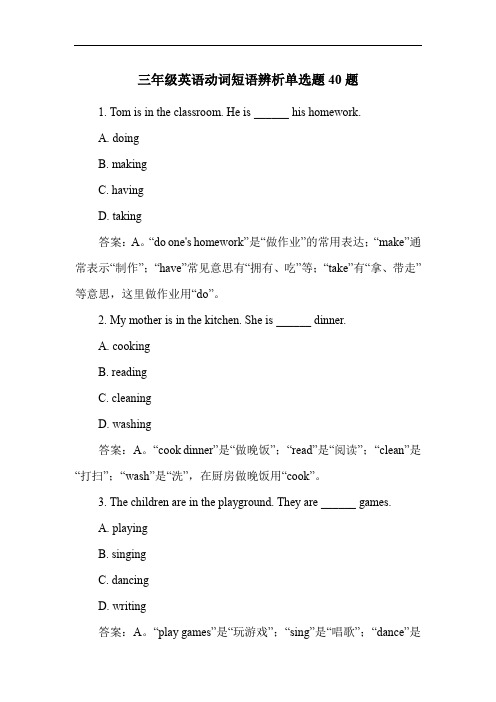
三年级英语动词短语辨析单选题40题1. Tom is in the classroom. He is ______ his homework.A. doingB. makingC. havingD. taking答案:A。
“do one's homework”是“做作业”的常用表达;“make”通常表示“制作”;“have”常见意思有“拥有、吃”等;“take”有“拿、带走”等意思,这里做作业用“do”。
2. My mother is in the kitchen. She is ______ dinner.A. cookingB. readingC. cleaningD. washing答案:A。
“cook dinner”是“做晚饭”;“read”是“阅读”;“clean”是“打扫”;“wash”是“洗”,在厨房做晚饭用“cook”。
3. The children are in the playground. They are ______ games.A. playingB. singingC. dancingD. writing答案:A。
“play games”是“玩游戏”;“sing”是“唱歌”;“dance”是“跳舞”;“write”是“写”,在操场玩游戏用“play”。
4. My father is in the garden. He is ______ flowers.A. wateringB. lookingC. watchingD. listening答案:A。
“water flowers”是“浇花”;“look”通常要和“at”搭配,“look at”表示“看”;“watch”有“观看”的意思;“listen”要和“to”搭配,“listen to”表示“听”,浇花用“water”。
5. The teacher is in the office. She is ______ a letter.A. writingB. readingC. speakingD. telling答案:A。
人教版三年级语文上册总复习(“的、地、得短语)
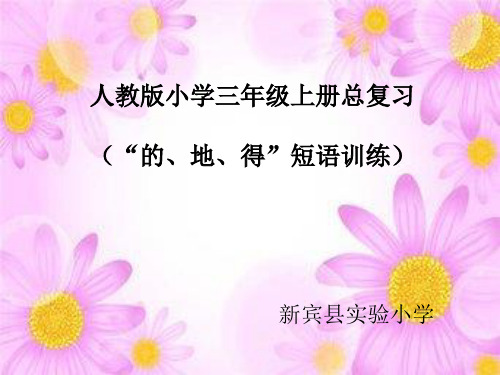
49、如梦醒来,暮色已降,豁然开朗 ,欣然 归家。 痴幻也 好,感 悟也罢 ,在这 青春的 飞扬的 年华, 亦是一 份收获 。犹思 “花开 不是为 了花落 ,而是 为了更 加灿烂 。 50、人活着要呼吸。呼者,出一口气 ;吸者 ,争一 口气。 51、如果我不坚强,那就等着别人来 嘲笑。
6、无论你正遭遇着什么,你都要从落魄 中站起 来重振 旗鼓, 要继续 保持热 忱,要 继续保 持微笑 ,就像 从未受 伤过一 样。
7、生命的美丽,永远展现在她的进取之 中;就 像大树 的美丽 ,是展 现在它 负势向 上高耸 入云的 蓬勃生 机中;像 雄鹰的 美丽, 是展现 在它搏 风击雨 如苍天 之魂的 翱翔中;像江河 的美丽 ,是展 现在它 波涛汹 涌一泻 千里的 奔流中 。
人教版小学三年级上册总复习 (“的、地、得”短语训练)
新宾县实验小学
“的”用法记忆小窍门
的地得,不一样,用法分别记心上, 左边白,右边勺,名词跟在后面跑。
美丽的花儿绽笑脸,青青的草儿弯下腰,
清清的河水向东流,蓝蓝的天上白云飘,
暖暖的风儿轻轻吹,绿绿的树叶把头摇,
小小的鱼儿水中游,红红的太阳当空照。
52、若不给自己设限,则人生中就没 有限制 你发挥 的藩篱 。 53、希望是厄运的忠实的姐妹。 54、辛勤的蜜蜂永没有时间悲哀。 55、领导的速度决定团队的效率。
56、成功与不成功之间有时距离很短 只要后 者再向 前几步 。 57、任何的限制,都是从自己的内心 开始的 。
58、伟人所达到并保持着的高处,并 不是一 飞就到 的,而 是他们 在同伴 誉就很 难挽回 。 59、不要说你不会做!你是个人你就 会做!
